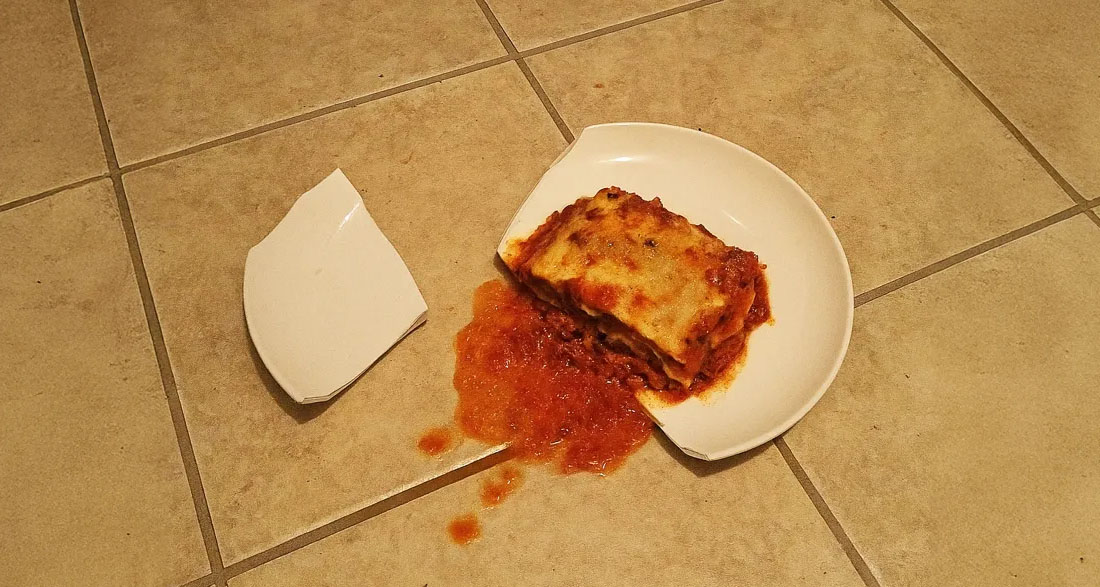My stepdad, Raymond, had an expectation that felt like something out of the 1950s: he demanded a fresh, home-cooked meal every day. If my mom, Colleen, even tried reheating leftovers, he’d throw a fit, tossing the food aside. “Real wives cook fresh food every day,” he’d say, like it was some unwritten rule.
Watching my mom shrink under his harsh words, I could feel my heart break for her. She had forgotten what real love, appreciation, and gratitude felt like. But I wasn’t about to let him get away with it anymore. I was going to give him a taste of humility.
My dad had died six years ago, and since then, Mom had been like a shadow of herself. The woman who had once been so vibrant, so full of life, now moved through the days like she was just going through the motions. They’d been high school sweethearts, married for 32 years.
Their love didn’t need grand gestures—it was the little things that made it real. Every morning, Dad would bring her coffee, kiss her temple, and head off to work. She would fold his socks just the way he liked—paired and rolled, never bunched up.
Even though I was two states away, I called her every day, trying to fill the silence that Dad had left behind. But no matter how much I called, I couldn’t fill the empty space at her dinner table.
“I’m fine, sweetie,” she’d say each time, but I could hear the sadness in her voice.
Then came Raymond. He worked with Mom at the community college. An accounting professor with slicked-back hair and too much cologne, he was one of those guys who made his presence known before he even entered a room. He started bringing her lunch at work and offering to help around the house.
“I think he makes me laugh again, Matty,” Mom told me one evening. “Do you know how long it’s been since I really laughed?”
I was glad someone was there for her. She deserved someone kind, someone to make her smile. I was happy for her… until the proposal came, followed by a quick wedding. They had a small beach ceremony, just a few people, with sand between their toes. In the photos, Mom looked radiant in a simple white dress, and Raymond actually looked happy. I forced myself to swallow my doubts and hugged them both tightly.
“Take care of her,” I whispered to Raymond.
“I will, always,” he said, patting me on the back too hard. “Your mom deserves the world.”
I wanted to believe him. Maybe that’s why I ignored the way he always interrupted her during the reception or how he complained about the cake being too sweet.
“Marriage is about compromise,” Mom said when I mentioned it later. “We’re both adjusting.”
I wanted to believe that too. But I was wrong. So, so wrong.
Six months later, I arrived at their door with a basket of fresh muffins and a bag packed for a week-long visit. When Mom hugged me, I noticed how much smaller she seemed, her frame frail against me.
“You’ve lost weight,” I said, studying her face.
“Oh, just trying to keep up with Raymond. He’s very particular about what he eats,” she said, brushing it off with a nervous laugh.
We sat down in the kitchen, sipping tea. Mom was in the middle of talking about her garden when suddenly, she pressed her fingers to her temple, wincing.
“Mom, are you alright?”
“Just a little headache, dear,” she said, her voice thin. “It’s just a cold that’s been hanging on for a week. Nothing serious.”
Her face was pale, her eyes shadowed. This wasn’t just a cold.
“Have you seen a doctor?”
“Raymond says it’s just allergies. I’ll be fine once I rest.” She got up to open the refrigerator. “I made lasagna yesterday. It’s your grandma’s recipe.”
She was pulling out the container when Raymond walked in. He was wearing a golf shirt, his face flushed from being outside.
“What’s for dinner?” he asked, not even bothering to greet me.
“I thought we’d have the leftover lasagna. I’m not feeling like cooking something fresh tonight.”
Raymond’s face darkened. “Leftovers? Again?”
“It’s still good, Ray. I just don’t have the energy to cook—”
The crash was so sudden, it made me jump. Raymond had swiped the container out of her hands, sending lasagna splattering across the floor.
“I’ve told you a hundred times! I don’t eat the same meal twice! Am I a man or a pig? A real wife cooks fresh food every day. That’s your job now. Is that so hard to understand?”
Mom was already on her knees, scrambling to pick up the mess. “I’m sorry,” she said, her voice shaking. “You’re right. I’ll make something else.”
I froze. In the six years since Dad’s death, I’d been worried about Mom being lonely, about her missing Dad. But this? I never imagined she’d be afraid of him, afraid of his temper, afraid of disappointing him.
I dropped down next to her. “Mom, stop. Let me help.”
I looked up at Raymond. “Does this happen often?”
He turned to walk away. “You can help by making something fresh, Matilda. I’ll be in my study.”
I couldn’t sleep that night. The image of Mom, kneeling on the floor, kept playing over and over in my head. I thought about calling the police—tell them my stepdad broke a dish, made my mom cry? It felt ridiculous. No. I needed a different plan. A better one.
I found Mom in the kitchen the next morning, already making pancakes.
“Let me cook today,” I said, taking the bowl of batter from her hands.
She looked relieved. “Are you sure? Raymond likes his breakfast at seven sharp.”
“I’m positive,” I said. “You should rest. You sound worse.”
She hesitated but nodded. “He likes his eggs over medium. Not too runny, not too firm.”
“Got it. Why don’t you go back to bed for a bit?”
She smiled weakly, grateful, and left. I pulled out every cookbook I could find and got to work. By 7:00, Raymond came downstairs, his newspaper tucked under his arm. He raised an eyebrow when he saw what I had made—golden pancakes, perfectly cooked eggs, crispy bacon, fresh fruit, and coffee.
“Well, look at this!” he said, sitting down. “Colleen could learn a thing or two from you.”
I smiled tightly. “Mom’s not feeling well. I thought I’d help out while I’m here.”
He took a bite of the pancake and nodded. “Now this is how a man should be treated in his own home.”
I bit my tongue so hard I almost tasted blood. “I’ll handle the meals while I’m here. Mom needs to rest.”
“Best idea I’ve heard all week,” Raymond said, chewing happily. “Your generation could use more women like you… ones who understand what kind of fresh food men really need.”
I watched him eat, planning my next move.
For the next four days, I became a one-woman restaurant. I made Eggs Benedict for breakfast, hand-rolled sushi for lunch, Beef Wellington for dinner—everything from scratch, beautifully plated, and served with a smile. My face ached from smiling.
“This is incredible,” Raymond kept saying. “You should come visit more often.”
By the third day, Raymond started posting pictures of my food on Instagram. “This is what real home cooking looks like! 🥩🍗🥘😋”
Mom watched it all in silence, her eyes sad but grateful. “You don’t have to do this,” she whispered on day four.
“Trust me, Mom. I know exactly what I’m doing.”
That night, I made Raymond’s favorite meal—herb-crusted lamb, rosemary potatoes, and glazed carrots. I set the table with candles and Mom’s best china.
“To good food and family,” Raymond toasted, raising his glass.
I clinked mine against his. “And to appreciating what we have.”
He dug in, savoring the lamb. “This is amazing. You really know how to treat a man.”
“Funny,” I said, watching him. “You’ve been eating the same three meals all week, just with different presentations. But you never noticed.”
Raymond froze, his fork halfway to his mouth. “What are you talking about?”
I smiled coldly. “That lamb? It’s the same one I made two days ago. I just cut it differently and added a new sauce. The potatoes? Leftovers from yesterday. The carrots? They’re from the beef dish on Monday. I’ve been recycling ingredients all week, and you’ve been praising every bite.”
Raymond’s face turned purple. “That’s disgusting.”
“Is it? Because five minutes ago, it was ‘the best meal you’ve ever had.’ You even posted it online.”
Mom appeared in the doorway, silent but watching. She squeezed my hand.
“You served me… leftovers?” Raymond gasped.
“Leftovers aren’t about laziness, Raymond. They’re about planning, efficiency, and not wasting food. Something my father understood perfectly.”
His face twisted with rage. “How dare you trick me like this!”
“How dare you treat my mother like your personal chef while she’s sick?” I shot back. “How dare you break dishes and make demands like a spoiled child?”
“This is between me and your mother.”
“It became my business the moment I saw her picking up broken dishes off the floor.” I turned to Mom. “Get your coat.”
“What?” Raymond and Mom said in unison.
“I made reservations at Antonio’s. The real one, not the leftover version.” I smiled at Mom. “You and I are going out. Raymond can heat up something for himself.”
Mom looked between us, her eyes wide.
“Go,” I said gently. “Wait in the car.”
After she left, I leaned across the table. “My mom spent 32 years with a man who appreciated everything she did. She deserves nothing less now.”
Raymond’s nostrils flared. “You have no idea what marriage is about.”
“I know it’s not about fear,” I said, straightening up. “There’s plenty of food in the fridge. Try not to throw any of it on the floor while we’re gone.”
At the restaurant, Mom was quiet until our pasta arrived.
“I should have said something sooner,” she whispered. “After your father… I was so lonely. Raymond seemed kind at first.”
“This isn’t your fault,” I reached across the table for her hand. “But it needs to end.”
She wiped a tear away. “I’m 62 years old. I never thought I’d be starting over.”
“You don’t heal in the same place that’s breaking you, Mom.”
“I want to be brave again, dear. I used to be.”
“You still are. You just forgot for a little while.”
I extended my visit another week, helping Mom pack Raymond’s things while he was at work. We changed the locks and moved his stuff to the garage.
When he came home and found his key didn’t work, he pounded on the door, yelling at us.
“This is my house!” he shouted.
Mom stood in the hallway, trembling but firm. “I’m sorry, Raymond, but this is my late husband’s house. You can say what you need to tomorrow when you pick up your things. For now, please leave.”
Later that night, after everything had settled, we sat on the porch swing, just like when I was little.
“What if I made a mistake?” Mom asked, her voice small.
“What if you didn’t?”
She thought for a moment. “Your father would be proud of you.”
“He’d be proud of both of us.”
Three months later, Mom called me on a Sunday evening.
“Raymond left me a voicemail. He wants to come over and cook me dinner. He says he’s changed. He’s begging me to call off the divorce.”
“What did you say?”
“I told him I already had plans. I’m having lasagna tonight. The same one I made yesterday. And it’s delicious!”
“And Mom? You know what goes great with lasagna? Freedom! And a kitchen where no one throws plates!”
Her laughter rang out, light and free.
Here’s the thing about entitlement: it eats itself. People like Raymond think they deserve service, but they forget love isn’t a right—it’s earned. And when you treat kindness like a chore, eventually, someone serves you a dish called consequences… with a garnish of get the hell out.














